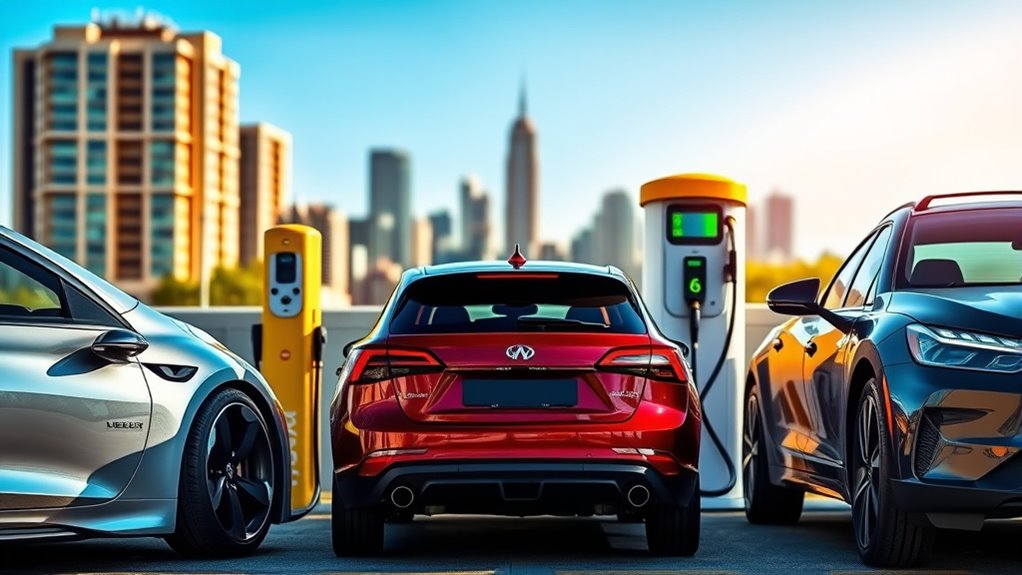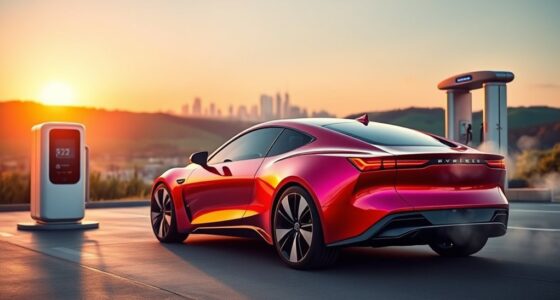Electric vehicles (EVs) produce zero tailpipe emissions, making them the best choice for the environment. Hybrids combine electric and gasoline, reducing emissions while providing flexibility for longer trips. Gasoline cars, while cheaper upfront, have higher long-term fuel and maintenance costs. Your decision should consider your lifestyle, budget, and access to charging infrastructure. Each option has pros and cons that fit different needs. Stick around to uncover more details and insights to guide your choice.
Key Takeaways
- Emissions: EVs produce zero tailpipe emissions, while hybrids emit less than gas cars but still release some pollutants.
- Fuel Source: EVs rely solely on electricity, hybrids use a combination of electric and gasoline, and gas cars run entirely on gasoline.
- Range: EVs may face range anxiety due to limited charging stations; hybrids and gas cars offer more flexibility for long-distance travel.
- Cost: Gas cars usually have lower initial costs, while EVs and hybrids may save money long-term due to lower fuel and maintenance expenses.
- Charging Infrastructure: EVs depend on a robust charging network, while hybrids can operate on gasoline when charging options are unavailable.

Electric vehicles (EVs) have gained considerable traction due to their zero tailpipe emissions. When you drive an EV, you’re contributing to a cleaner environment, which is increasingly important given the tightening emission regulations. However, one of the key factors to consider is the charging infrastructure. Depending on where you live, you might find it easy or difficult to charge your vehicle. Urban areas tend to have a more robust network of charging stations, while rural areas may lag behind, making it essential to assess your daily driving habits and charging options before opting for an EV.
Hybrid vehicles offer a middle ground between electric and gas cars. They combine a gasoline engine with an electric motor, allowing you to enjoy better fuel efficiency without the full commitment of an EV. This can be particularly appealing if you’re concerned about the charging infrastructure, as hybrids can run solely on gasoline when needed. They can alleviate range anxiety, especially for longer trips, while still benefiting from the reduced emissions that come with electric driving. However, hybrids still produce some emissions, which may not align with your eco-conscious values.
Gasoline cars are the traditional option, and they remain popular for many reasons. They tend to have a lower initial purchase price than electric or hybrid vehicles, and their widespread availability means you won’t face the same challenges with charging infrastructure. However, as emission regulations become stricter, gas vehicles may face limitations, particularly in urban areas where low-emission zones are being established. Plus, the long-term costs of fuel and maintenance can add up.
Ultimately, your choice between electric, hybrid, and gas cars should reflect your lifestyle, budget, and environmental concerns. As you weigh your options, consider how each vehicle aligns with your daily routines and values. By understanding the implications of charging infrastructure and emission regulations, you can confidently choose the vehicle that best suits your needs. Additionally, considering the color accuracy of your vehicle’s display can enhance your overall driving experience.
Frequently Asked Questions
How Do Maintenance Costs Compare Across Electric, Hybrid, and Gas Cars?
Maintenance costs vary across vehicle types. Electric cars often have lower maintenance costs because they lack oil changes and have fewer moving parts, though battery degradation can be a concern long-term. Hybrid vehicles might have moderate costs since they combine gas and electric systems, leading to potential repair costs for both. Gas cars typically incur higher maintenance costs due to more frequent repairs and part replacements. Overall, electric vehicles usually save you money in the long run.
What Is the Average Lifespan of Electric Vehicle Batteries?
Think of electric vehicle batteries as your car’s heart, tirelessly pumping energy. On average, you can expect battery longevity around 8 to 15 years, depending on usage and care. It’s like a long-term investment in your ride! However, when the time comes for a replacement, costs can range from $3,000 to $7,000, which is a consideration to keep in mind. But overall, they can offer great performance and efficiency during their life.
Are There Tax Incentives for Purchasing Electric or Hybrid Vehicles?
Yes, there are tax incentives for purchasing electric or hybrid vehicles. You can often benefit from government rebates that help reduce the overall cost. These incentives vary by state and can include federal tax credits, which can substantially lower your tax bill. Be sure to check for local programs, as some areas offer additional savings. Investing in an electric or hybrid vehicle not only saves money but also supports eco-friendly initiatives.
How Do Charging Times Differ Between Electric and Hybrid Cars?
When it comes to recharging, electric cars typically require a bit more patience than their hybrid counterparts. You’ll find that charging infrastructure varies greatly, with electric vehicles often needing several hours to fully charge, depending on battery technology and charging stations. Hybrids, on the other hand, can rely on gasoline for longer trips, giving you more flexibility. So, while electric cars might take time to recharge, hybrids offer a more immediate solution when you’re on the go.
Can Gas Cars Be Converted to Hybrid or Electric?
Yes, gas cars can be converted to hybrid or electric, but conversion feasibility varies based on your vehicle’s make and model. Some kits are available for specific cars, allowing you to reduce emissions impact markedly. However, the process can be complex and costly, so weigh the benefits against the investment. You might find it easier to buy a dedicated hybrid or electric vehicle instead, depending on your budget and preferences.
Conclusion
In brief, choosing between electric, hybrid, and gas cars depends on your lifestyle and priorities. Did you know that electric vehicles can save you around $800 a year in fuel costs compared to gas cars? With advancements in technology and growing charging infrastructure, electric and hybrid options are more accessible than ever. So, whether you’re eco-conscious or just looking to save money, there’s a car out there that fits your needs perfectly.










